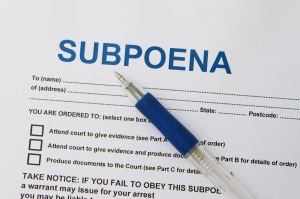
Congressional investigations can be a nightmare for both individuals and businesses. Businesses may find themselves in the midst of chaos when they have to respond to congressional inquiries, while also performing damage control to keep the company’s reputation intact. Companies subject to congressional investigations often risk temporary or permanent damage to their corporate reputation, which may affect investor confidence. Oftentimes, individuals and businesses are forced to disclose confidential, sensitive and/or personal information in the midst of the investigation.
Failing to disclose requested documents and information could lead to congressional subpoenas and possible criminal charges in federal court for failing to comply. An experienced white-collar defense attorney familiar with congressional investigations can help ensure that any individuals or business summoned by these federal authorities have their rights fully protected.
If someone or their business is under investigation, congressional investigation attorneys can provide the insight and experience needed to achieve the best possible result. An attorney will walk the client through every step of the process, and patiently and thoroughly explain all of the intricacies involved in such matters.
There are a number of factors that they must review, so it is crucial to contact a DC congressional investigations lawyer and provide them with all of the information so they can help gain a complete understanding of the process. In the meantime, please refer to the following information for a general overview of the congressional investigations process.
Experienced Congressional Investigation Attorneys
Consulting and working with an experienced congressional investigations lawyer in DC is critical for arming an individual with the best protection in a congressional investigation. They will need an attorney who understands how Congress works and how congressional investigations are conducted. It is also recommended to consult with an attorney who has a strong track record and who is based in Washington, DC.
While the attorney cannot speak for their client, they can attend the hearing and provide counsel including valuable guidance on what questions to answer and the appropriate response. This is a legal protection allowed for anyone who was subpoenaed, and it should not be overlooked or under-valued.
The Purpose of a Congressional Subpoena
The purpose of a subpoena is to command a targeted person to testify or produce documents to the committee to further its investigation or both. A congressional committee hearing is often partisan and political, with committee members sometimes asking pointed questions to advance a particular agenda. The key to responding to an investigation request is to fully understand the investigation scope long before the committee hearing.
Often, committee staff and investigators will have performed many interviews and sought many specific documents before the actual hearing. All of these activities signal the direction the committee members are leaning, and particularly the likely direction of the leadership.

The party testifying at a congressional investigation hearing is expected to do so under oath and truthfully. However, unlike a trial, a party testifying cannot rely on a lawyer to speak on their behalf. To prevent oneself from saying something that may subsequently turn into a criminal or civil lawsuit, a party has to decide whether to answer the committee’s questions or decline to say anything because a truthful answer may implicate the witness in criminal activity.
When a person refuses to answer a question by “pleading the Fifth Amendment,” they are utilizing their constitutional right that prevents self-incrimination. Congress can grant full or partial immunity to witnesses who refuse to testify and exercise their Fifth Amendment right.
Supreme Court Cases
The Constitution grants Congress broad authority to enforce its investigative power. Significant Supreme Court case laws that support and define Congress’ authority to conduct investigations are listed below.
- Eastland v. United States Servicemen’s Fund, 421 U.S. 491 (1975)
- United States v. Nixon, 418 U.S. 683 (1974)
- Yellin v. United States, 374 U.S. 109 (1963)
- Hutcheson v. United States, 369 U.S. 599 (1962)
- Barenblatt v. United States, 360 U.S. 109 (1959)
- Watkins v. United States, 354 U.S. 178 (1957)
- Quinn v. United States, 349 U.S. 155 (1955)
- McGrain v. Daugherty, 273 U.S. 135 (1927)
Congressional Investigation Risks
A federal investigation should never be taken lightly. Sometimes people who are called to testify before a congressional committee face criminal charges after the congressional hearing is complete. Charges that may result from congressional testimony can include, but are not limited to:
- Contempt
- False statements
- Obstruction of committee proceedings
- Perjury
There are many other ways that a person’s congressional testimony can lead to criminal charges. Anyone subpoenaed for a congressional investigation should consider consulting with a well-qualified white-collar defense attorney.
Staff Depositions
While staff depositions are considered to be more efficient and less adversarial than congressional hearings, these special depositions are subject to a number of legal shortcomings. Congressional hearings are required to adhere to specific questions, actions or points. However, during staff depositions, it is not uncommon for an ambitious or misguided staff member to go on a tangent and ask questions that have no relevance to the actual actions at issue. Similarly, the oath administered to witnesses during these depositions is not subject to the same force or penalties like those of perjury in open court, or in a congressional committee hearing.
Granting Immunity
Under the Fifth Amendment to the Constitution, no person may be compelled to give evidence against themselves in any setting or for any reason. Congress has a direct mechanism by which the Fifth Amendment may be overcome. However, with a congressional grant of immunity from prosecution based on testimony, Congress both satisfies the requirement of the Fifth Amendment and allows itself access to the information desired of a given individual. However, Congress alone cannot fully immunize a witness from prosecution.
The U.S. Attorney’s office or other relevant DOJ departments within the Criminal Division must also agree. Even if immunity is granted, this is not an assurance that a person may not be prosecuted for tangential or other criminal acts outside the scope of a congressional investigation, or on the basis of evidence gathered and sealed by the prosecution prior to the congressional investigation.
This additionally requires the cooperation and consent of the Office of the United States Attorney General, because this office will ultimately be the prosecuting authority. Such immunity requests, once they are duly submitted by Congress, are subject to a 10-day review period by the Attorney General and potentially a further 20-day review by the Supreme Court. While neither body has the authority to overturn an immunity bargain on its own, each may review the grant of immunity to ensure the appropriate procedure was followed and that the information sought by this compulsory testimony is in accordance with the proper functions of Congress.
Contacting a Washington DC Congressional Investigations Attorney
If someone has been subpoenaed by Congress, is under investigation, or believed to be under investigation by a congressional committee, do not hesitate to speak with one of the dedicated white-collar defense attorneys qualified to represent the individual at a congressional investigation. Time is a factor and the stakes are high. Contact our DC law offices today to schedule an in-office consultation with one of our white-collar defense lawyers. Let a DC congressional investigations lawyer fight for you.
